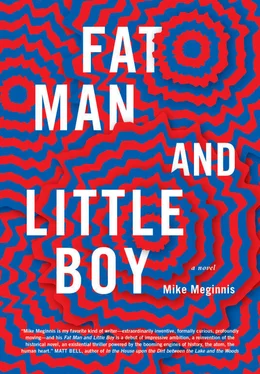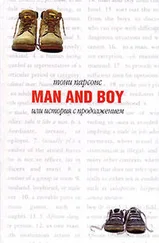More shifting sounds. None clear. Could be anything.
“Do you think that I can make you happy?” says Fat Man.
“No. But I could make you so.”
Little Boy regulates his breathing.
“Don’t worry,” says the widow. “I’m barren. I can do whatever I want.”
There is a whisper. There is a whisper.
There is a whisper.
Peace and peace and peace.
There is a sound that could be a wooden chair shifting beneath the weight of two bodies. All its pieces snapping into the sweetest position of their most perfect strain, their maximum capacity, the tremor of bearing all that can be borne.
Or it is the sound of a door slowly latching?
What do you do in a quiet room?
What can you? Alone.
The objects are innocent. They can stay that way. The knife did not mean to cut. The gun does not weep. So why should the bomb?
If you are alone, then no one is hurt. If no one is hurt, you are pure: beautiful and small.
Another summer, after breakfast. Fat Man tickles the newborn baby underneath her chin. She coos and grasps his finger, hers sinking into the fat of his. Fat Man says, “What’s the little beauty’s name?”
“You don’t remember?” asks the mother, feigning hurt. He begins to apologize. “That’s all right,” she says. “I know we all keep you busy. We’re calling her Rose.”
“After the widow?”
The new mother nods.
The baby is a blonde. Ghostly strands spiral in a crown, shining all around her head, half invisible against it. He smells her head. The sweet baby potato smell. He rubs her little tummy.
“What a good little tummy,” he says. “What a good little girl. No crying.” He kisses her head.
“She never cries when you’ve got her,” says the father. “You’ve got a way with the little ones, don’t you?”
Fat Man lowers his head, shielding his eyes with the wide brim of his hat. “They seem to like me. Who knows why?”
The father rubs Fat Man’s back without recoiling from the pool of sweat between his shoulder blades. “Don’t be so modest. You’ve made us feel at home this whole year. What’s for dinner tonight?”
“Swordfish,” says Fat Man, tickling the undersides of the baby’s feet. She kicks and kicks. Her eyes lock with his. Lovely blue. “Ice cream for dessert. American-style sundaes, actually—banana splits, chocolate sauce drizzle, salted peanuts, sprinkles, lots of whipped cream, and a cherry on top. A chocolaty stout is recommended.”
Now come the former newlyweds, now the hotel elders—patriarch and matriarch—a wailing baby in each of Daddy’s arms: the twins. Their firstborn toddles behind, tugged by a long red ribbon tied around her wrist by doting mother. “Can we borrow John a moment?” asks the panic-stricken patriarch. “They won’t stop.”
“Of course,” says the first father. Fat Man passes off little Rose and takes the twins, who immediately quiet. Baby Rose looks over her father’s shoulder to watch as Fat Man rocks the babies to peace. He cups their rumps and blows on their bare bellies. They laugh and laugh.
“Pretty babies,” says Fat Man. “Good little boys. You be good brothers to each other, okay?”
Now Little Boy comes by. He sets down his cleaning things and asks for a baby. Fat Man gives him one of the twins. Little Boy makes faces at his share of the brothers. They show the babies to each other, holding them beneath their arms, bobbing them up and down. The baby brothers touch their feet. Everyone laughs. But then there are more babies crying. Everyone is having such a rough day! Fat Man laughs and laughs, like a baby. So does Little Boy. They laugh and laugh together. Everyone laughs with them. Someone loads each brother with another baby. The matriarch’s ribbon-bound toddler latches on to Fat Man’s knee with her free hand, the other extended as far as possible so she can reach, pulled taut by the red ribbon clutched absently by her mother. Soft, sweet skin presses on the brothers from all directions. Fat Man can’t keep track of all the good little babies.
Soon Rosie comes upon the happy gathering. “Now what have we here?” She touches John’s back, as the father did, between the shoulder blades, in a pool of damp and stick. “Are my boys being good?”
“He’s so good with babies,” exclaims the matriarch.
“Come along John,” says Rosie, very nearly flirtatious. “We’re going to a movie.”
“I want to come,” says Little Boy.
The young matriarch says, “You need to stay here and help us with all these babies.”
Fat Man and the widow leave them in this way: mobbing Little Boy, bringing children peace by proximity. They take the widow’s car. When he is a driver Fat Man keeps his eyes on the road, searching for obstacles, mindful of every possibility, every physical necessity. He drives as if a crash is imminent. As a passenger, he is more laconic, gazing a long way down the road. The widow touches his knee, once, lightly, only a little. He says, without looking away from the rural blur where the land meets the sky, “Do you ever miss your husband?”
“It’s a damn fool who parachutes into a foreign country when they’ve got machine guns aimed up his rear.”
“Do you ever miss me?”
“I haven’t had the chance.”
The Oriental spirit medium is passed out underneath the tree that’s like a willow. The branches pull away from her as best they can, rising up on end. The effect is that of a large, powerless animal raising its hackles, as much to beg for mercy as to press a threat. The shadow avoids the medium as well, falling against the sun, out in the open, diametrically opposite the direction of every other shadow cast by every other thing. The medium’s legs are splayed within her red, silken robe, which is parted too far up, a sliver of pale skin, smooth and smooth, and the inner silk, a darker shade of red. There are loose threads at the fringes. Her forearm lies across her eyes to shield them from the light. There is a vodka bottle flat on its side, among the roots, empty of all but the dregs. Little Boy takes the bottle. He tilts it in circles, sloshing the liquor.
Fat Man says, “This is just like in the movie.”
“How is this just like in the movie?”
“They found a beautiful woman on the ground in a park.”
“Who did?”
“Able Hanway. Or Baker. They were playing the same man again.” He kneels, touches the silk, and sniffs his fingers. “I think it was Baker. Anyway, they carry her back to their apartment. She wakes up in their bed and screams. It turns out she has amnesia. That’s the premise of the film.”
“Did the beautiful amnesiac turn out to be a fraud who made the brothers foul themselves on stage in front of an audience of hundreds?”
“No,” says Fat Man. “She turned out to be an angel. The main character helped her remember who she was, but the more she remembered the more distant she grew, until finally she had this sort of mile-long gaze, and a strange, almost creepy smile. Finally she had to leave and go to heaven. She said she would see them again someday. But of course it wasn’t ‘them,’ it was him, because there was only one of them on camera, weeping. I think it was Able. I think he’s the one who cries for them. He’s good at it.”
“Maybe we should get Masumi,” says Little Boy.
“Let’s take her home to him,” says Fat Man. “Maybe she’ll be grateful and decide not to hate us anymore, and she’ll convince him of the same.”
It’s strange to see the Oriental spirit medium outside, especially in daylight. Little Boy claimed to have made sightings in the night, when the medium was said to walk among the cabins and the trees, always alone. When pressed, however, Little Boy had to admit the figure he had seen was only that: a figure. It had always been possible that this medium, though Japanese, was not that medium. Many must have left Japan, Fat Man figured—there would be too many ghosts. Masumi still walked and ate and studied language among the hotel’s guests and staff, though he often left on trips for weeks at a time, under cover of darkness, when no one could see him go—and indeed, none did. He, unlike his wife, known only as “the medium,” did not like speaking with the other guests outside the library and the occasional comment during meals. He had come to quite like Fat Man’s cooking. He had not threatened anyone in some time, though Fat Man caught him, at least once a week, boring holes into Fat Man’s skull with his eyes: a steady, focused glare. His wife’s leadership was essential to the health of the hotel, both as a community and in terms of finance, which led Rosie to accept the Oriental spirit medium, as well as the unstable, alcoholic Masumi.
Читать дальше












